A good night’s sleep is paramount for having good mental and physical health – choosing the right pillow for you is one of the best ways to improve that. Below you’ll find a comprehensive pillow-buying guide to help you make an informed choice.
What are the different pillow types?
There are several different types of pillows to choose from, each designed to cater to different sleeping preferences and needs. Common pillow types include memory foam, bamboo, and down pillows.
Memory foam pillows
Memory foam pillows are made from polyurethane foam, designed to contour to your head shape and position when pressure is applied. This means your head and neck are supported, and it also ensures your spine is aligned, resulting in a comfortable night’s sleep.
These pillows are generally best for people who sleep on their back, as this complements the alignment benefits. However, they are comfortable for most sleepers, no matter which way you lie!
Bamboo pillow
There are so many benefits to choosing a bamboo pillow; bamboo is moisture-wicking and highly breathable, meaning you’ll stay cool as you sleep and wake up fresh. Also containing memory foam, you’ll benefit from those incredible body-aligning properties too! Bamboo is super soft, meaning a very comfortable night’s sleep.
Bamboo is the perfect choice for those with allergies – naturally hypoallergenic and antibacterial, and it’s inhospitable to bed bugs and dust mites. You’ll know you’re getting a safe night’s sleep and protecting your skin in the process.
![[BBPureWhitePillowcases] Bamboo Bedding Two Pure White Pillowcases Couples Changing Pillows](https://cdn.shopify.com/s/files/1/0807/7331/6934/files/Pure_White_Pillowcase_Bamboo_Bedding_Pillowcases_Changing.webp?v=1721308653)
What factors to consider when choosing a pillow?
When choosing a new pillow, there are a few different things to consider. Picking the perfect pillows for the whole family is an important task!
-
Sleep position: The way you sleep plays a major role in what pillow will best support your neck and spine.
-
Pillow loft and firmness: Pillows come in low, medium, and high lofts. Your ideal loft depends on your sleep position and body type. Balance softness and support to prevent neck or shoulder pain.
-
Material and fill: Bamboo, memory foam, feather, and down all offer different benefits. Bamboo is breathable and hypoallergenic; memory foam provides contouring support.
-
Pillow cover and maintenance: Look for removable, washable covers. Bamboo covers get softer with every wash and stay antimicrobial.
-
Budget and extras: Bamboo pillows are long-lasting and often come with warranties or trial periods for peace of mind.
What is the best pillow for your sleeping position?
If you don’t consider your sleeping position when shopping for a pillow, you may be heading for aches and pains, or even incorrect spinal alignment. A bamboo memory foam pillow could be considered head and shoulders above the rest, as it's a good choice for all sleeping positions. Still, we’ll advise on the optimum support depending on your preferred position.
Back sleepers
The best pillows for back sleepers are ones that have a medium loft and medium to firm support. It’s important that back sleepers have a pillow which relieves pressure from the neck and spine. Hollowfibre and wool are among the best pillows for back sleepers, but we’d also advise a memory foam pillow, such as our Memory Foam Bamboo Pillow. As well as being highly breathable and hypoallergenic, it’s filled with 3rd generation orthopaedic memory foam and fresh bamboo, intuitively adapting to your back and alleviating aches.
Side sleepers
Most people choose to sleep on their side, and it's considered the most comfortable and healthy way to position yourself for sleep. The best pillows for side sleepers are ones that provide a higher loft, providing support for your neck and shoulders when asleep. A firm or medium-firm pillow will give the support needed for the spine – it’s advisable to look for a pillow that relieves pressure points, such as our Hybrid Bamboo Pillow. Made with charcoal-infused memory foam, it adapts to your sleeping position.
Front sleepers
Some experts suggest that those who sleep on their front don’t need a pillow; however, a low-loft pillow will help improve comfort and support. The best pillows are feather or down fill varieties, providing a cushioned buffer between yourself and the mattress. Our Hybrid Bamboo Pillow features a cloud-like soft bamboo cover and our innovation of Active O2 Micro-pods™, which help to circulate air inside the memory foam.
Pillow loft and firmness
Our orthopaedic expert, Bethany, believes a pillow's firmness is important to its supportiveness: "Pillow loft and firmness can be down to personal preference; however, it is important to balance softness with support so that you wake up pain-free and well-rested."
The term ‘pillow loft’ relates to how high your pillow is – or how thick. Pillows generally come in three lofts:
- Low loft – three inches thick or less.
- Mid loft – between three and five inches thick.
- High loft – five inches thick or more.
The great thing about memory foam and bamboo pillows is that they mould to you when pressure is applied so that you can find the right thickness for you.
It is also important to balance softness and support; while a super soft and squishy pillow might sound absolutely dreamy, it’s vital that the pillow you choose offers the right amount of support for you. If you find yourself waking up with a sore neck or aching shoulders, it might be that yours isn’t offering you the support you need.

Material and fill
Another factor in choosing where to lay your head at night is the material and fill used. If you have allergies or sensitivities, take this into account. Bethany confirms, "If you have allergies or sensitivities you may not respond well to feather or synthetic materials. Choose bamboo for it’s hypoallergenic, breathability and thermoregulating properties." Bamboo is naturally hypoallergenic, so it’s great for those with difficulties. Feathers can be too itchy, and cotton might be too abrasive; bamboo is the perfect option.
We all love the cool side of the pillow, so finding one which is temperature-regulating is a good idea. Bamboo does just that with its thermoregulating properties, and it’s breathable meaning there is a good oxygen flow.
Pillow cover and maintenance
Accidents happen, and finding pillows with removable covers is a great way to ensure their longevity: being able to wash the cover means the pillow itself won’t incur any stains! Bamboo gets softer with every wash, which doesn’t take away from the hypoallergenic and antimicrobial properties. Bethany advises that regular cleaning will increase durability, "Maintenance, i.e removal of covers, is a great way to ensure longevity and allow for regular washing."
Additional considerations
Budget and value for money can be big things to consider when making purchases for your home and family; bamboo pillows are great value for money as they are so long lasting. You can also look for handy trial periods and longer warranties offered by brands for extra peace of mind!
Like many things, buying new pillows often comes down to personal preference. This is where it might be handy to shop in-store and get a feel for the type of pillow you want to buy – and it’s also where those trials come in handy.
Tips for pillow care and maintenance
You don’t want to make life difficult, so choosing a pillow with easy cleaning instructions is a great way to go. Traditional pillows without a removable cover are much harder to clean and can get lumpy when you do try, whereas bamboo covers can go straight in a cool wash and come out softer than ever!
Panda London Bamboo Pillows are guaranteed for 10 years, meaning you won’t need to replace them for a decade; traditional pillows often need to be replaced much faster, meaning you’re spending more and also adding to landfill.
Buying a new pillow
Choosing which pillow to buy is all down to guaranteeing yourself a comfortable night’s sleep – what’s best for the position you snooze in and what will help you wake up feeling rested. It’s also worth considering any allergies you may have and what’s best for your price point. A quality pillow is a worthwhile investment for optimal sleep, and it’s always a good time to treat yourself!
FAQs
1. Why is choosing the right pillow important?
Choosing the right pillow is crucial because it directly impacts your sleep quality and overall comfort. A suitable pillow properly supports your neck and spine, reduces the risk of developing aches and pains, and promotes restful sleep.
2. How do I determine the right pillow for me?
Finding the right pillow involves considering factors such as your sleeping position, personal preferences, specific health conditions, and pillow materials. Assessing your needs and trying different options to determine what works best is important.
3. How often should I replace my pillow?
Traditional pillows should be replaced every 1 to 2 years, depending on the type and quality of the pillow. Over time, pillows lose their shape, accumulate allergens, and may no longer provide adequate support. If you notice your pillow has become lumpy, flat, or uncomfortable, it's likely time for a replacement.
4. How do I determine the best pillow thickness or loft?
The thickness or loft of a pillow should be determined based on your sleeping position and personal preference. Side sleepers generally benefit from higher lofts to maintain proper spinal alignment, while back and stomach sleepers may prefer lower lofts to avoid excessive neck strain.
5. Can I wash my pillow?
Bamboo pillows come with a luxurious removable cover which can be washed on a cool setting and air dried, getting softer with every wash. This cover protects your pillow and helps it last longer, meaning you can sleep well for years to come.
6. Can I try a pillow before purchasing it?
Testing out a pillow in-store gives you a good feel for how comfortable it is, but you should also look for a trial period, allowing you to fall in love with your new pillow at home before you truly commit!

![[MattressTopper] Panda London Memory Foam Bamboo Mattress Topper package box](http://pandalondon.com/cdn/shop/files/Bamboo_Mattress_Topper_Package_Box.webp?v=1742301823&width=1500)
![[MattressTopper] Panda London Memory Foam Bamboo Mattress Topper on the floor](http://pandalondon.com/cdn/shop/products/Panda-Memory-Foam-Bamboo-Mattress-Topper-Yoga-e1624045454555.jpg?v=1742301823&width=1000)
![[MattressTopper] Bamboo Mattress Topper Lifestyle Image with Memory Foam Pillows Product Page](http://pandalondon.com/cdn/shop/files/Bamboo_Mattress_Topper_Lifestyle_Image_with_Memory_Foam_Pillows_Product_Page.webp?v=1742301823&width=800)
![[MattressTopper] Bamboo Mattress Topper Lifestyle Image with Bamboo Pillows In the Garden room Product Page](http://pandalondon.com/cdn/shop/files/Bamboo_Mattress_Topper_Lifestyle_Image_with_Bamboo_Pillows_In_the_Garden_room_Product_Page.webp?v=1752572859&width=800)
![[MattressTopper] Panda London Memory Foam Bamboo Mattress Topper side](http://pandalondon.com/cdn/shop/files/Mattress_Topper_Isolated_-_resized.jpg?v=1752572859&width=800)
![[HybridMattressPro] Main Image for Hybrid Bamboo Mattress Pro with all awards](http://pandalondon.com/cdn/shop/files/Hybrid_Bamboo_Mattress_Pro_Main_product_Image_with_awards.webp?v=1753971649&width=1000)
![[HybridMattressPro] Breathable Hybrid Bamboo Mattress](http://pandalondon.com/cdn/shop/products/Breathable-Hybrid-Bamboo-Mattress.jpg?v=1753971649&width=1920)
![[HybridMattressPro] Hybrid Bamboo Mattress Pro Cover Zip](http://pandalondon.com/cdn/shop/files/Hybrid_Bamboo_Mattress_Cover.jpg?v=1753971649&width=800)
![[HybridMattressPro] Panda Hybrid Bamboo Mattress Pro](http://pandalondon.com/cdn/shop/files/Hybrid_Bambo_Memory_Foam_Mattress_-_BioCell_Foam_x.jpg?v=1755095108&width=800)
![[HybridMattressPro] Couple on a Hybrid Bamboo Mattress Pro](http://pandalondon.com/cdn/shop/files/Hybrid_Bamboo_Mattress_Couple.jpg?v=1753971649&width=800)
![[CloudDuvet] Panda London The Cloud Bamboo Duvet Packaging](http://pandalondon.com/cdn/shop/products/Panda-London-The-Cloud-Bamboo-Duvet-Panda-Life-scaled_00a651ad-4ca3-4105-b520-12a94c1a4f71.jpg?v=1713363286&width=1920)
![[CloudDuvet] Panda London The Cloud Bamboo Duvet Rolled](http://pandalondon.com/cdn/shop/products/Duvet-Listing-Images03.jpg?v=1713361452&width=1000)
![[CloudDuvet] Panda London The Cloud Bamboo Duvet Girl Huggin a Duvet on the Bed](http://pandalondon.com/cdn/shop/files/Cloud_Bamboo_Duvet_-_Lady_Hugging_it_on_Bed_LifestyleImage.jpg?v=1719327585&width=1000)
![[CloudDuvet] Panda London The Cloud Bamboo Duvet Guy In the Air with Cloud Bamboo Duvet](http://pandalondon.com/cdn/shop/files/GuyonaHybridBambooMattresswithCloudDuvet.jpg?v=1743097928&width=2000)
![[CloudDuvet] Panda Cloud Duvet Winter on the bed lifestyle image](http://pandalondon.com/cdn/shop/files/Panda_Cloud_Duvet_Winter_on_the_Bed_Lifestyle-1_image.jpg?v=1747994959&width=1000)
![[BBWhite] White 100% Bamboo Bedding](http://pandalondon.com/cdn/shop/files/Pure_White_Full_Bed.webp?v=1719581797&width=1000)
![[BBWhite] White 100% Bamboo Bedding Texture](http://pandalondon.com/cdn/shop/files/100_Bamboo_Bedding_-_Pure_White_-_Close_Up_02.webp?v=1719581781&width=1000)
![[BBWhite] White 100% Bamboo Bedding Woman in bed sleeping](http://pandalondon.com/cdn/shop/files/100-Bamboo-Bedding-Set-Pure-White-BB.webp?v=1719581846&width=768)
![[BBWhite] White 100% Bamboo Bedding Woman Duvet cover buttons](http://pandalondon.com/cdn/shop/files/hand_and_buttons_1.webp?v=1719581781&width=1000)
![[BBWhite] White 100% Bamboo Bedding Woman in bed looking and smiling-](http://pandalondon.com/cdn/shop/files/SatonMadeBed-White100_BambooBedding-white_-_BB_SideShot1000x1000.webp?v=1719581864&width=980)
![[BBUrbanGrey] Urban Grey 100% Bamboo Bedding](http://pandalondon.com/cdn/shop/files/Made_Bed_-_Urban_Grey_-_Wide_Shot_2_1_1.webp?v=1754572609&width=1000)
![[BBUrbanGrey] Cloud Duvet Urban Grey 100% Bamboo Bedding Set](http://pandalondon.com/cdn/shop/files/Cloud_Duvet_-_Grey_-_Close_up_2.webp?v=1754572609&width=1000)
![[BBUrbanGrey] Urban Grey 100% Bamboo Bedding Set Woman sitting on the bed](http://pandalondon.com/cdn/shop/files/Sat_in_Bed_-_Grey_100__Bamboo_Bedding_-_Wide_Shot.webp?v=1754572609&width=1000)
![[BBUrbanGrey] Urban Grey 100% Bamboo Bedding Set Woman Duvet buttons Panda London](http://pandalondon.com/cdn/shop/files/hand_buttons_grey_bedding_1.webp?v=1754572609&width=1000)
![[BBUrbanGrey] Woman Sitting on the Bamboo Bedding with coffee](http://pandalondon.com/cdn/shop/files/SatonMadeBed-White100_BambooBedding-SideShot1000x1000.jpg?v=1754572609&width=1000)
![[BBNavyBlue] Deep Sea Navy Blue 100% Bamboo Bedding](http://pandalondon.com/cdn/shop/files/Made_Bed_-_Navy_-_Wide_Shot_3_copy.webp?v=1754576637&width=1000)
![[BBNavyBlue] Deep Sea Navy Blue 100% Bamboo Bedding Texture](http://pandalondon.com/cdn/shop/files/Cloud_Duvet_-_Navy_-_Close_up_2.webp?v=1754576637&width=1000)
![[BBNavyBlue] Deep Sea Navy Blue 100% Bamboo Bedding Woman Sitting on the bed](http://pandalondon.com/cdn/shop/files/Sat_Up_in_Bed_-_Navy_100__Bamboo_Bedding_-_Hands_on_Bed.webp?v=1754576637&width=1000)
![[BBNavyBlue] Deep Sea Navy Blue 100% Bamboo Bedding Duvet Cover Buttons](http://pandalondon.com/cdn/shop/files/Cloud_Duvet_Cover_Buttons_-_Deep_Sea_Navy.webp?v=1754576637&width=1000)
![[BBNavyBlue] Deep Sea Navy Blue 100% Bamboo Bedding Woman sitting on the bed looking away](http://pandalondon.com/cdn/shop/files/SatonMadeBed-White100_BambooBedding-SideShot1000x1000-001.webp?v=1754576652&width=980)
![[BBPink] Vintage Pink Blue 100% Bamboo Bedding](http://pandalondon.com/cdn/shop/files/Made_Bed_-_Pink_-_Wide_Shot_copy.webp?v=1754576652&width=1000)
![[BBPink] Vintage Pink Texture 100% Bamboo Bedding](http://pandalondon.com/cdn/shop/files/Cloud_Duvet_-_Pink_-_Close_up_2.webp?v=1754576652&width=1000)
![[BBPink] Vintage Pink Woman Sitting on the 100% Bamboo Bedding](http://pandalondon.com/cdn/shop/files/Sat_Up_in_Bed_-_Pink_-_Hands_on_Bed.webp?v=1754576652&width=1000)
![[BBPink] Vintage Pink Woman Sitting on the 100% Bamboo Bedding Duvet Cover](http://pandalondon.com/cdn/shop/files/Cloud_Duvet_Cover_Buttons_-_Vintage_Pink.webp?v=1754576652&width=1000)
![[BBPink] Vintage Pink Woman Sitting on the 100% Bamboo Bedding Woman looking far away](http://pandalondon.com/cdn/shop/files/SatonMadeBed-White100_BambooBedding-SideShot1000x1000-001_Vintage_Pink.webp?v=1754576652&width=980)
![[BBGrey] Light Grey 100% Bamboo Bedding](http://pandalondon.com/cdn/shop/files/Made_Bedding_in_Bedroom_-_Urban_Grey_-_Wide_Shot.webp?v=1754576637&width=1000)
![[BBGrey] Light Grey 100% Bamboo Bedding texture](http://pandalondon.com/cdn/shop/files/Texture17.webp?v=1754576637&width=1000)
![[BBGrey] Light Grey 100% Bamboo Bedding with Woman smiling](http://pandalondon.com/cdn/shop/files/Sat_Up_in_Bed_-_Grey_-_Hands_on_Bed.webp?v=1754576637&width=1000)
![[BBGrey] Light Grey 100% Bamboo Bedding with Duvet Cover buttons](http://pandalondon.com/cdn/shop/files/Cloud_Duvet_Cover_Buttons_-_Quiet_Grey.webp?v=1754576637&width=1000)
![[BBGrey] Light Grey 100% Bamboo Bedding with Woman smiling and sitting coffee](http://pandalondon.com/cdn/shop/files/SatonMadeBed-White100_BambooBedding-SideShot1000x1000-002-_Grey.webp?v=1754576637&width=980)
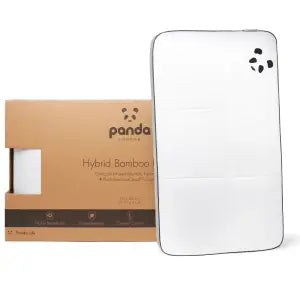 Hybrid Bamboo Pillow
Hybrid Bamboo Pillow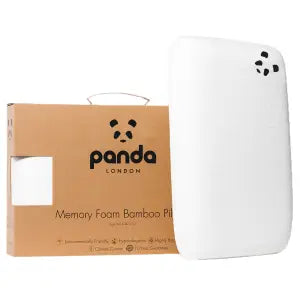 Memory Foam Bamboo Pillow
Memory Foam Bamboo Pillow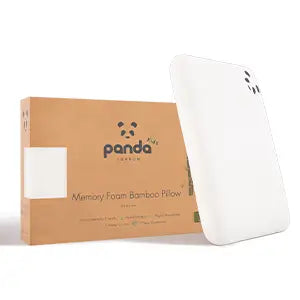 Kids Memory Foam Bamboo Pillow
Kids Memory Foam Bamboo Pillow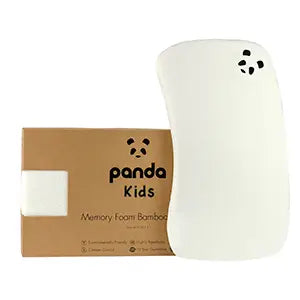 Baby Memory Foam Bamboo Pillow
Baby Memory Foam Bamboo Pillow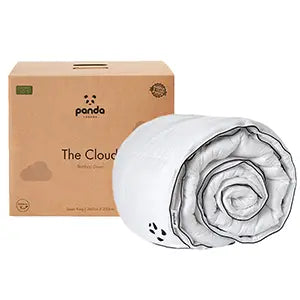 Panda Cloud Duvet
Panda Cloud Duvet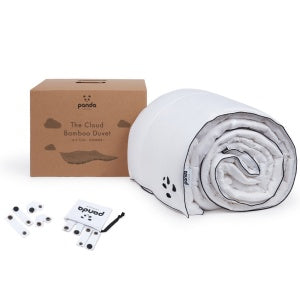 Bamboo Summer Duvet
Bamboo Summer Duvet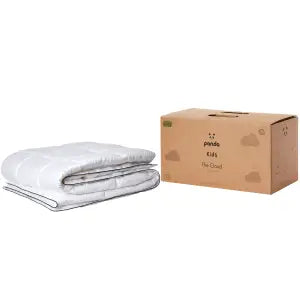 Kids Cloud Duvet
Kids Cloud Duvet
![[HybridPillow] Hybrid Bamboo Pillow - Mattress Campaign](http://pandalondon.com/cdn/shop/products/Hybrid-Bamboo-Pillow-Mattress-Campaign.jpg?crop=region&crop_height=1615&crop_left=152&crop_top=0&crop_width=1615&v=1750023555&width=1920)
![[HybridPillow] Hybrid Pillow with Panda brand marking](http://pandalondon.com/cdn/shop/products/Hybrid-Pillow_8.jpg?v=1750023555&width=1920)
![[HybridPillow] Couples laying on Hybrid Bamboo Pillows](http://pandalondon.com/cdn/shop/files/Hybrid_Bamboo_Pillow_Product.jpg?v=1750023555&width=1000)
![[HybridPillow] Red Hair Girl sleeping on a Hybrid Bamboo Pillow](http://pandalondon.com/cdn/shop/files/Hybrid_Bamboo_Pillow_-_Red_Hair_Girl_Product.jpg?v=1750023555&width=1000)
![[HybridPillow] Guy Hugging Hybrid Bamboo Pillow](http://pandalondon.com/cdn/shop/files/Hybrid-Bamboo-Pillow-Man-holding-the-pillow-1024x1024_jpg.webp?v=1750023555&width=1024)
![[Pillowcovers] Panda Bamboo Pillow Covers](http://pandalondon.com/cdn/shop/products/Panda-Bamboo-Pillow-Covers.jpg?v=1713362508&width=1920)
![[Pillowcovers] Panda London | Hybrid Memory Foam Pillow (1:4)](http://pandalondon.com/cdn/shop/products/Panda-London-Hybrid-Memory-Foam-Pillow-14_4fea77df-b60a-476b-b08a-6407e8ea2c47.jpg?v=1718209482&width=1920)
![[Pillowcovers] Pillowcase-Bamboo-Pillow-New](http://pandalondon.com/cdn/shop/products/Pillowcase-Bamboo-Pillow-New.png?v=1719410969&width=1000)
![[Pillowcovers] Pillowcase-Kids-Pillow-White-Background-](http://pandalondon.com/cdn/shop/files/Kids-Pillow-White-Background-Square_jpg.webp?v=1713361847&width=745)
![[Pillowcovers] Baby memory foam bamboo pillow image](http://pandalondon.com/cdn/shop/products/Panda-Memory-Foam-Bamboo-Pillow-Baby.jpg?v=1718207318&width=1536)
![[MemoryFoamPillow] Panda Luxury Memory Foam Bamboo product image](http://pandalondon.com/cdn/shop/products/Panda-Memory-Foam-Bamboo-Pillow-Panda-Life-scaled-e1623788835840.jpg?v=1750023574&width=800)
![[MemoryFoamPillow] Panda London Bamboo Memory Foam Pillow](http://pandalondon.com/cdn/shop/files/03_Memory_Foam_Bamboo_Pillow__alt01.jpg?v=1750023574&width=800)
![[MemoryFoamPillow] Panda London Bamboo Memory Foam Pillow girl hugging the pillow](http://pandalondon.com/cdn/shop/files/02_Memory_Foam_Bamboo_Pillow__alt02.jpg?v=1750023574&width=800)
![[MemoryFoamPillow] Panda London Bamboo Memory Foam Pillow on a Panda Topper](http://pandalondon.com/cdn/shop/files/Memory-Foam-Bamboo-Pillow-on-Bed-Topper-and-Adjustable-Straps-Shown-Lifestyle-Square-768x768_png.webp?v=1750023574&width=768)
![[MemoryFoamPillow] Panda London Bamboo Memory Foam Pillow Girl Holding Pillow Lifestyle](http://pandalondon.com/cdn/shop/files/01_Memory_Foam_Bamboo_Pillow__alt04.jpg?v=1750023574&width=800)